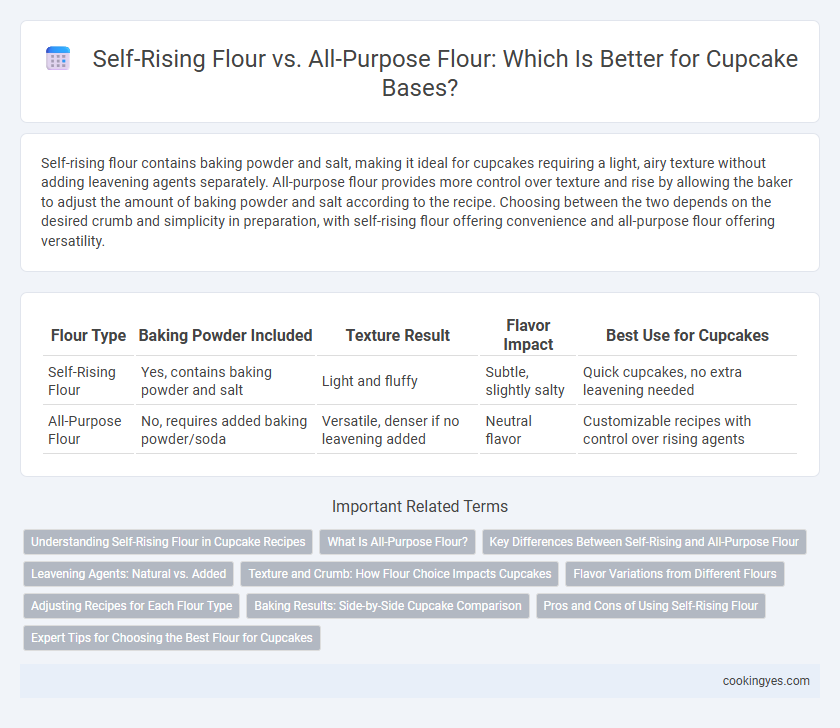Self-rising flour contains baking powder and salt, making it ideal for cupcakes requiring a light, airy texture without adding leavening agents separately. All-purpose flour provides more control over texture and rise by allowing the baker to adjust the amount of baking powder and salt according to the recipe. Choosing between the two depends on the desired crumb and simplicity in preparation, with self-rising flour offering convenience and all-purpose flour offering versatility.
Table of Comparison
| Flour Type | Baking Powder Included | Texture Result | Flavor Impact | Best Use for Cupcakes |
|---|---|---|---|---|
| Self-Rising Flour | Yes, contains baking powder and salt | Light and fluffy | Subtle, slightly salty | Quick cupcakes, no extra leavening needed |
| All-Purpose Flour | No, requires added baking powder/soda | Versatile, denser if no leavening added | Neutral flavor | Customizable recipes with control over rising agents |
Understanding Self-Rising Flour in Cupcake Recipes
Self-rising flour contains a precise blend of all-purpose flour, baking powder, and salt, simplifying the leavening process in cupcake recipes. Using self-rising flour ensures consistent rise and tender crumb without adding extra leavening agents. This flour is ideal for straightforward cupcake bases, providing balanced texture and flavor effortlessly.
What Is All-Purpose Flour?
All-purpose flour is a versatile, finely milled wheat flour commonly used in baking, providing a moderate protein content typically ranging from 10% to 12%, which gives cupcakes a tender yet sturdy crumb. It contains no leavening agents, allowing bakers to control rising by adding specific ingredients like baking powder or baking soda to achieve the desired texture and height. This flour's balanced gluten formation makes it ideal for cupcake bases that require a delicate crumb and consistent structure.
Key Differences Between Self-Rising and All-Purpose Flour
Self-rising flour contains pre-measured baking powder and salt, providing a leavening effect that helps cupcakes rise without additional ingredients, while all-purpose flour requires separate leavening agents for structure and rise. The protein content in all-purpose flour ranges from 10-12%, yielding a denser texture, whereas self-rising flour's formulation supports a lighter, fluffier cupcake crumb. Choosing between these flours impacts the recipe's chemical balance, texture, and overall cupcake volume.
Leavening Agents: Natural vs. Added
Self-rising flour contains built-in leavening agents like baking powder and salt, providing a consistent rise in cupcakes without extra additives. All-purpose flour lacks these leavening components, requiring separate baking powder or baking soda for proper cupcake texture and volume. Choosing self-rising flour simplifies the recipe by balancing acidity and leavening, while all-purpose flour offers more control over rise and crumb structure through custom leavening adjustments.
Texture and Crumb: How Flour Choice Impacts Cupcakes
Self-rising flour contains leavening agents and salt, which create a lighter, fluffier texture and a finer crumb in cupcakes, making them rise more evenly without additional ingredients. All-purpose flour provides a denser, chewier texture with a coarser crumb, offering more control over the leavening process when paired with baking powder or baking soda. Choosing self-rising flour simplifies baking with consistent softness, while all-purpose flour allows customization of cupcake texture and rise.
Flavor Variations from Different Flours
Self-rising flour contains baking powder and salt, which creates a lighter and fluffier cupcake texture with a subtly tangy flavor, enhancing the overall sweetness. All-purpose flour offers a neutral taste, allowing other ingredients like vanilla or cocoa to shine, resulting in a more balanced and customizable flavor profile. Choosing between these flours influences the cupcake's crumb structure and flavor intensity, shaping the final taste experience.
Adjusting Recipes for Each Flour Type
Self-rising flour contains leavening agents and salt, which require reducing or eliminating added baking powder and salt in cupcake recipes to avoid over-rising or salty flavors. When using all-purpose flour, incorporate baking powder and salt according to the recipe's specifications for proper cupcake texture and rise. Adjusting ingredient quantities ensures a tender crumb and consistent results regardless of flour type.
Baking Results: Side-by-Side Cupcake Comparison
Self-rising flour yields cupcakes with a lighter texture and a slightly fluffier crumb due to the built-in leavening agents, while all-purpose flour produces a denser, more structured cupcake that allows for greater control over rising by adjusting separate leavening ingredients. In a side-by-side cupcake comparison, self-rising flour results in a quicker rise and consistent volume but may limit flavor customization compared to the versatility of all-purpose flour. Cupcakes made with all-purpose flour often exhibit a more pronounced buttery taste and can achieve varying textures based on the precise mix of baking powder or baking soda used.
Pros and Cons of Using Self-Rising Flour
Self-rising flour simplifies cupcake baking by combining all-purpose flour with baking powder and salt, ensuring consistent leavening and a tender crumb without additional ingredients. Using self-rising flour can save time and reduce measuring errors, but it limits control over the rise and texture compared to all-purpose flour, which requires separate leavening agents for customization. Overuse or incorrect substitution of self-rising flour may lead to overly dense or salty cupcakes, making it essential to adjust recipes carefully.
Expert Tips for Choosing the Best Flour for Cupcakes
Self-rising flour contains baking powder and salt, offering a convenient leavening agent that produces lighter, fluffier cupcakes without extra ingredients. All-purpose flour provides more control over texture and flavor, making it ideal for bakers who prefer customizing their recipes with specific leavening agents and salt levels. Experts recommend choosing self-rising flour for quick, consistent results or all-purpose flour for precise adjustments to achieve the perfect cupcake crumb and rise.
Self-Rising Flour vs All-Purpose Flour for Cupcake Base Infographic

 cookingyes.com
cookingyes.com